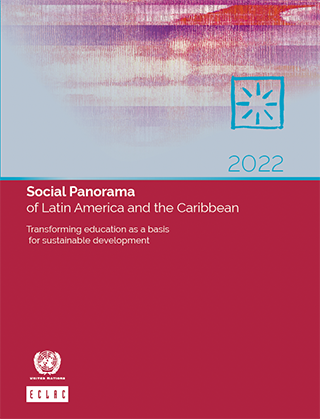Social Panorama of Latin America and the Caribbean 2022: Transforming education as a basis for sustainable development
By ECLAC
Social Panorama of Latin America and the Caribbean, 2022 has four chapters. Chapter I presents the relevant macroeconomic background in terms of the evolution of per capita GDP, employment, household income distribution and the consumer price index, and looks at how income inequality and poverty have changed over the past two decades (2002–2021). The chapter also discusses changes that occurred in social stratification during the pandemic.
Chapter II addresses the worrying silent crisis of education as another of the pandemic’s major consequences, as well as the successive crises that have accompanied it. Despite previous progress in access to education, the lengthy interruption of face-to-face educational services during the pandemic deepened long-standing educational inequalities, reflected in gaps in access to quality alternatives for continuing education and in the availability of resources for remote learning. However, this silent crisis in education also represents an opportunity for transformation. The chapter addresses a number of priorities, including maintaining safe conditions for reopening schools, investing in strategies to identify the costs of disruption to face-to-face education, in terms of both learning and socioemotional well-being, and designing and implementing recovery strategies aimed at leaving no one behind.
Chapter III looks at access to education and the unequal labour impacts of the pandemic on men and women. The severe setbacks experienced by women in the labour market contrast with their notable advances in access to education, which, paradoxically, have not translated into greater equality in the labour market. The chapter considers in particular the role to be played by the development of more knowledge-intensive sectors, especially in STEM-related fields, in advancing towards progressive structural change.
Finally, chapter IV analyses the social institutional framework and the evolution of social spending in Latin America and the Caribbean. Social institutions are crucial for establishing universal, comprehensive, sustainable and resilient social protection systems. ECLAC advocates an approach focusing not only on the evolution, volume, destination and financial sustainability of the public resources that make up social spending, but also on other institutional dimensions. This would enable those resources to fulfil their purpose in an effective, efficient, transparent and accountable manner by means of high-quality social policies, as set forth in the Regional Agenda for Inclusive Social Development.
Get the report here











